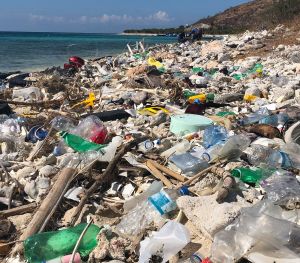
Plastic waste litters a beach in Haiti (4 Ocean photo)
All the plastic bags, bottles and rubbish we casually throw in the gutter end up our streams, rivers, lakes and oceans. We have to take personal responsibility for our litter, or we will soon drown in our own muck.
Last week, David Moorcroft addressed the problem of too large cruise ships in endangered historic ports of call, and the garbage the visitors leave behind, in his excellent story: Leviathans of the Lagoon Getting Cast Adrift. That’s one sort of pollution. In my new three-part series I’ll address other urgent world-wide pollution problems.
The Americans were the first to recognize the problem of public littering and its impact on the environment. New York advertising copywriter Paul Gioni created a wonderful new word – litterbug – for a campaign as long ago as 1947, to promote the idea that every individual has a duty to protect our world against the effects of litter. Those of us of a certain age will remember the so-called Crying Indian ad of 1971, where Indigenous actor Iron Eyes Cody paddled his canoe through water filled with rubbish in the shadow of a big city. What an iconic image that left in our minds, showing the destruction of the earth’s natural beauty caused by the thoughtless pollution and litter of our modern society.
Of course, we have long despoiled the earth, as the poet William Blake pointed out in Jerusalem, writing about the “dark Satanic Mills” of the Industrial Revolution. The dreadful effects of climate change are finally waking people up to the long-term result of pollution on an industrial scale, but as individuals we can do little to counteract that, except to protest at every opportunity.
What we can do, each of us, is pay attention to the more personal problem of litter. Every bit of plastic or rubbish we toss aside has the potential of ending up in a stream, river, lake or the ocean. Unfortunately, when we charge others with taking care of our rubbish and recycling, they are not always as careful as we would want them to be. The recent scandals of Canadian garbage and so-called recycling being shipped to the Philippines and Malaysia reveals an unpleasant underside to the recycling and garbage disposal world. The company responsible for shipping Canadian garbage to the Philippines has gone out of business, leaving their mess for others to clean up. The value-less plastic sent to Malaysia is still in limbo. Unfortunately, there are thousands of tons of mis-labelled waste floating around the world, and most of it ends up floating around the oceans.
Just as the Indigenous paddler saw garbage floating in the waters of the Hudson, anyone who has fished or vacationed near a coast (anywhere on earth) cannot but help be aware of the massive problem created by disposable plastic.
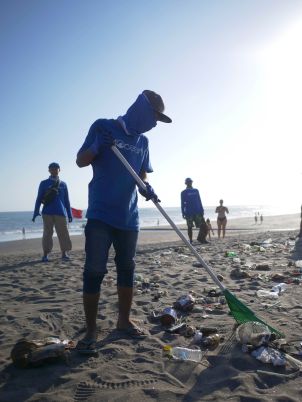
Beach clean up in Bali (4 Ocean photo)
At a tender age, I was dumped in an English boarding school, while my parents escaped to warmer climes, first in Egypt. Our headmaster enrolled us in the Wolf Cubs (no choice, though I never regretted it) and one of our first chores as a group was to scour the school grounds for litter. Woe betide the boy who dropped a candy (sweet) wrapper, a corporal offense. So, from a very early age I had the notion of personal responsibility for littering (literally) beaten into me.
On my first holiday to Cairo, one of the sights we were taken to see was the city garbage dump, so huge almost 10 thousand people lived on it, surviving on what they could scrounge, recycle or devour. Goodness only knows how many live there now. Sources say 60 thousand, but curiously these inhabitants, mostly Coptic Christians, have a better recycling rate than many western cities, though their standard of living remains appallingly low and the health risks unsurprisingly high. The River Nile, where we sailed from the Cairo Yacht Club, and my father became an officer, was rather like sailing in a sewer, where the detritus of 99 million people still flows unchecked into the Mediterranean Sea.
When my dad retired, he went to live on his 48-foot sailing ketch in the Canary Islands. On my first trip to Gran Canaria I was shocked to see the garbage spilling down hillsides behind mountain villages, to be washed into the dry river beds during flash floods, finally ending up in the Atlantic. Fields of plastic-covered tomatoes, cucumbers and peppers dominated the arable areas, and all the tons of greenhouse plastic was either burned or dumped straight into the ocean at the end of each season.
I’ve sailed on yacht charters from the British Virgin Islands to St. Vincent, and holidayed on countless other islands. My first trip south as a ‘snowbird’ was in the late 60s. Then we snorkelled on vibrant reefs in crystal clear waters off unspoiled golden beaches at Ocho Rios, Jamaica. Every year, throughout the Caribbean, the problem of litter and pollution seemed worse. On the British and Commonwealth islands, yachts were asked to use sewage holding tanks and cruise ships were prevented from discharging sewage and garbage.
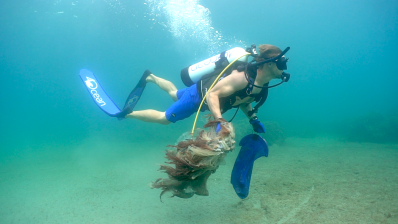
Picking up plastic from the ocean floor (4 Ocean photo)
On the French islands a more laissez-faire attitude prevailed. At the Pointe-à-Pitre marina on Guadeloupe charter boats pump their raw sewage right into the basin, and since there is very little tide, it has become truly disgusting. When one nearby boat needed an underwater repair, the technician had to don a full dry suit to go in the water. Afterwards workers hosed him down dockside for more than 10 minutes to rid his suit of the stink and risk of contamination.
On my last visit to the Grenadines, the outer reefs in the Tobago Cays Marine Park were entirely dead, plastic bags and other refuse entangled with the bleached white coral heads. More recently, boating through the shallow waters off Emerald Bay Marina, Grand Bahama, litter was floating in the water everywhere. Every morning a bulldozer removed cubic yards of rubbish from our resort’s beach and that was just what had washed up overnight. Snorkelling off the beach wasn’t pleasant. On a visit to Barbados’ famous flower cave, supposedly filled with colourful sea anemones, not one was to be found by our guide.
My long-ago dreams of floating in a cloud of brilliant blue or yellow tangs among lively corals, in water so clear one could see forty feet, have vanished, perhaps for ever.
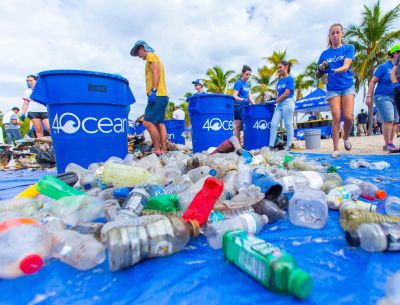
Volunteers clean up a Florida beach (4 Ocean photo)
Lest this seem an entirely third-world problem, recall that until 1992 New York dumped most of its sewage and garbage in the ocean. After Congress voted to ban the common practice of using the ocean as a municipal chamber pot, New York was the last US city to comply. The end of ocean dumping meant the beginning of a new and troubling era for a city that was already struggling to recycle, burn, export, sell and bury nearly 30,000 tons of garbage every day.
In Canada, as recently as 2018, Montreal dumped five-billion litres of sewage into the St. Lawrence in one incident. Halifax infamously dumped their raw sewage into the Atlantic until 2008. Victoria still dumps about 130-million litres of raw sewage daily into the Pacific Ocean.
On a more positive note, Prince Edward Island has, since Canada Day this year, totally banned plastic bags in the Province. In a groundbreaking move, the Sobeys grocery chain, headquartered in Nova Scotia, announced this month that they would remove plastic bags from their 255 locations across Canada which will take 225 million plastic grocery bags out of circulation each year. Whole Foods, operating in the US, Ontario and British Columbia, stopped using plastic bags in 2008. Let’s hope it won’t take the other big chains as long to see the light.
Last week Ontario Environment Minister Jeff Yurek announced plans to make product manufacturers and retailers responsible for the province’s recycling efforts, beginning in 2023 and rolling out over two years. “This is the most effective and accountable way to promote waste diversion because it encourages producers to make decisions that will reduce waste or improve resources that can be recovered from their products,” he said. “Making producers responsible should also mean that hard-to-recycle plastics are eliminated, unnecessary single-use plastics are banned, and there are requirements to reduce the amount of plastic waste generated,” Environmental Defense‘s Plastics Program Manager Vito Buonsante said in a statement. Good show, guys, but why wait until 2023?
Lake Ontario Waterkeepers is focused on the water quality of the last of the Great Lakes, where several giant watersheds and the rest of the lakes drain through. Their three aims: to create swimmable, drinkable, fishable water. They’re mostly concerned with stopping pollutants such as sewage overflow, industrial waste and gas station run off reaching the lake and beaches, but their efforts are still laudable. Unfortunately, they also have to cope with the effects of 50 million Americans, with less than efficient water treatment plants, living upstream. Naturally, with all those people pissing in our water source, I don’t drink the tap water, however well the City says they treat what they draw from the lake.
The UK’s Keep Britain Tidy program has been running for years, and their Ocean Recovery Project started in 2016, with efforts focused on particular parts of the coastline. In one recent campaign they removed 165 tons of plastic from England’s south western beaches. It’s still a very piecemeal operation.
The outstanding charity 4 Oceans, founded in 2015 by two young American surfers, Andrew Cooper and Alex Schulze, appalled at the rubbish on a once pristine beach in Bali, has started to make a dent in the issue of plastic ocean pollution. Their approach is unusual and unique. They have engaged and paid local workers to clean up their part of the ocean. The work is funded by the sale of bracelets made in Bali from the recycled plastics scooped from the water. Since 2017 they have cleaned up five and a half million pounds of plastic. Starting in Bali, they have expanded to the southern US and recently, Haiti. They also have a comprehensive volunteer program, which will expand into Canada in September.
What can you do today?
- Set a good example to others by not littering, especially encouraging kids to take their garbage to a bin.
- Cut out plastic grocery check out bags by shopping with reusable ones. (We use Sainsbury’s excellent “Strong and Sturdy” orange bags and bring them back from the UK to Canada.)
- Cut out plastic water bottles. (How hard is it to use a refillable one?)
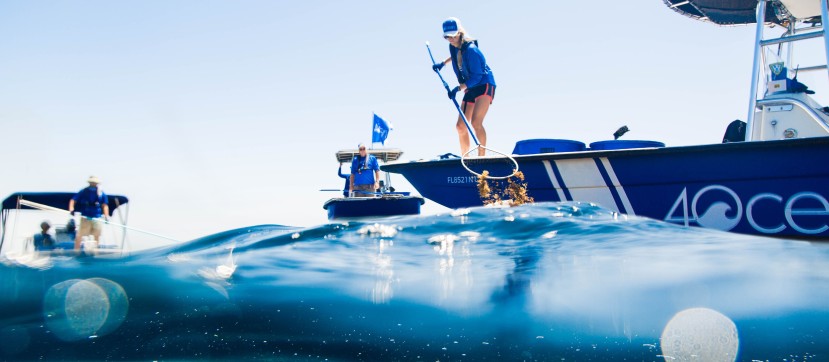
Featured image: Cleaning up the ocean, one scoop at a time. All photos supplied by 4 Ocean, used with thanks.
Check out Part II of this series, “Who’s a Litterbug?” the anti-litter campaign needs to be much more dramatic and Part III, “A Spirit of Community,” how every small effort helps.
Please LIKE this blog, if you have enjoyed the article, or add a COMMENT — clickable at the top or bottom of each story. Click on the FOLLOW button at the bottom of the page if you would like to receive email notifications of new articles.
This is Nigel’s 254th blog on Gentleman’s Portion. The SEARCH function at the top works really well if you want to look back and see some of our previous stories.
Categories: Opinion

Well done, Nigel. A timely article on a very troubling subject. There was an interesting segment on ’60 Minutes’ last evening on this very subject.
LikeLike